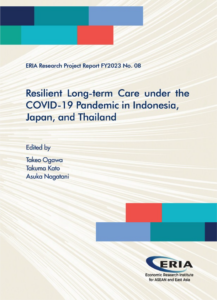The COVID-19 pandemic has brought attention to the vulnerabilities of long-term care systems in Indonesia, Japan, and Thailand. While institutional care serves as a means to provide standardized care services to older individuals, it also exhibits weaknesses that can contribute to outbreaks and the severity of infection clusters. Enclosed spaces within these facilities require proper ventilation to prevent the spread of infectious diseases.
It is important to acknowledge that older people in Indonesia and Thailand have been able to endure the COVID-19 pandemic due to the unwavering dedication of their families and community volunteers. Their support has played a crucial role in safeguarding the well-being of the elders during these health crises.
This report, published by ERIA, proposes the development of training programs aimed at enhancing the crisis response capabilities of caregivers and care workers, including migrant care workers, as a step towards building resilient long-term care systems. These programs would focus on equipping care workers with the necessary skills and knowledge to effectively and efficiently respond to crises and mitigate the spread of infections. Additionally, the report advocates for the prioritization of the establishment of business continuity management practices within long-term care providers to foster a community-based integrated care system.


